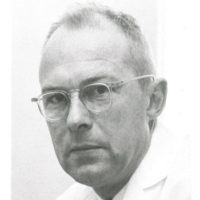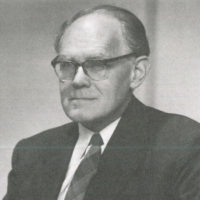
James V. Neel
University of Michigan

L.S. Penrose
University College, London
For laying the foundation for research in human genetics; and, specifically, to Dr. Neel for his work on thalassemia and sickle cell anemia.
One of the great pioneers of modern human genetics, L.S. Penrose has played a major role in laying the foundations for the rapid development of this branch of science during recent years, as its general importance to medicine has been recognized. Beginning 30 years ago with an interest in the heredity of mental disease, he conducted a long series of researches which culminated in a classic publication, “The Biology of Mental Defect,” which is not only an extraordinarily comprehensive survey of the etiology of mental deficiency but also an outstanding treatise on human genetics.
Professor Penrose and his associates have been responsible over the years for studies which touch all aspects of human genetics, including genetic analyses of most of the known hereditary diseases, contributions to mathematical genetics, biochemical genetics, the study of gene linkage in man, and theoretical work on the mutagenic effect of ionizing radiation. Most recently, their attention has been turned to abnormalities of human chromosomes associated with congenital defects.
Throughout this career, Professor Penrose has been a source of inspiration and guidance to many younger workers in his field who have come to the Galton Laboratory at University College for training and who are now pushing forward the frontiers of human genetics in many parts of the world. His work, both as an investigator and as a teacher, represents an important contribution to knowledge in the life sciences; it has brought an increased understanding of the complex interactions between heredity and environment which underlie human disease and has led to the development of conceptual schemes which have stimulated new and fruitful investigations in medicine.
After a brief career in zoology, James Neel entered medical school and completed his training in internal medicine in 1946. Since that time he has risen to a pre-eminent position in the field of human genetics, and, as Professor of Human Genetics and Internal Medicine at the University of Michigan, he symbolizes the recognition in this country of the great importance of genetics as a branch of medical science.
His work on two important diseases of the blood—thalassemia and sickle cell anemia—demonstrated conclusively that genetic principles are applicable to the study of many major diseases and not just to elucidation of the inheritance of bizarre anatomical or metabolic abnormalities. By the use of simple laboratory tools for recognition of the minor abnormalities exhibited by the carriers of abnormal genes, he was able to prove that the classical disease, sickle cell anemia, was the clinical expression of the abnormal gene in the homozygous offspring of parents, each of whom manifested the sickle cell trait. This fundamental contribution was independently confirmed in the brilliant work of Pauling and his associates upon the chemistry and inheritance of human hemoglobins.
In addition to this and several other important contributions to our knowledge of the operation of genetic mechanisms in human diseases, Dr. Neel’s work with the Atomic Bomb Casualty Commission in Japan has made him one of the world’s outstanding authorities on the genetic effects of ionizing radiation in man. The continuing observations in Japan, based upon his careful theoretical formulations of the extraordinarily difficult problems involved in drawing valid conclusions from data collected in a large population group, have assured mankind that maximal information for its future guidance in the peaceful development of nuclear energy will be extracted from the horrors of atomic warfare.
